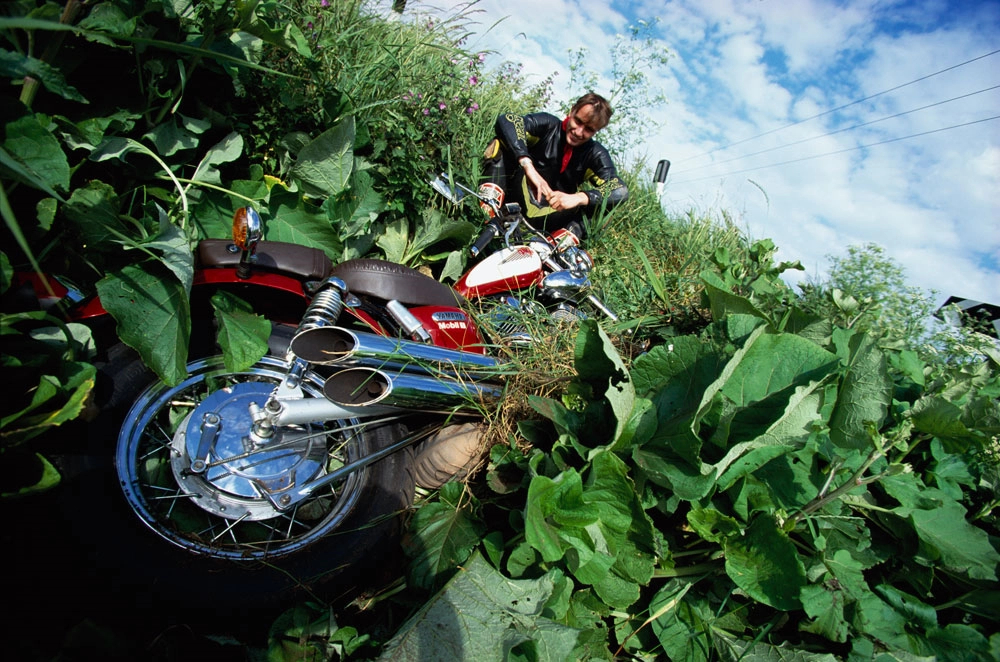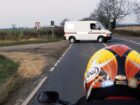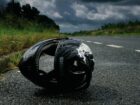Following the unfortunate event of a motorcycle accident there are many questions likely to be asked. Thankfully our expert team of journalists along with help from our resident solicitor, Andrew Campbell from Bikelawyer, are here to answer some of them!
- Can I buy my crashed bike back from my Insurer?
- What if the wheelie was nothing to do with accident?
- What if I fail to stop for a minor collision?
- What should you do if mud on the road caused a crash?
- What should you do if you’re knocked off on a roundabout?
- What should you do if you are involved in an accident with an uninsured driver?
- Should I accept an offer from the MIB?
- What should you do if you had an accident in a car park?
- Do I need a solicitor if the police interview me following an accident?
- Call our experts
Can I buy my crashed bike back from my Insurer?
In the event of a total loss, the salvage/motorcycle will become the property of the insurer. You may be given the option to purchase any remaining salvage at the amount your motorcycle will attract on the open market in its damaged condition, but this is at the discretion of the insurer. If you have an agreed value policy (a free option with our ‘Classic’ and ‘Vintage’ policies), this option is included as standard, so please check your insurance documents.
If you are interested in retaining your bike in the event of it being a total loss, you should express an interest as soon as you register a claim. If it’s a category A or B write-off they are not allowed to put the motorcycle back into circulation. However, the majority of write-offs are category C or D so hopefully you stand a good chance of getting the bike back to repair yourself.
What if the wheelie was nothing to do with the accident?
What happens in the event that you’ve been spotted pulling a wheelie minutes before an accident that wasn’t your fault? Well, pulling a wheelie is actually an example of dangerous driving as far as the police are concerned.
However, if that wheelie was a significant distance before the accident scene and had no bearing on the accident circumstances, you could argue that the two events were completely separate and that the cause of this accident was the other driver’s negligence.
It would be helpful if you had witnesses confirming the sensible speed at which you were riding and a detailed plan of the road layout to show that you were not at fault at the time of the accident.
We are fairly confident if you could prove this that a court would not find that the wheelie had anything to do with the accident.
What if I fail to stop for a minor collision?
If you have even a minor collision with another vehicle always stop to inspect the damage and possibly exchange details with the other driver.
The law requires you to either stop at the scene and exchange all personal and insurance details with the other party.
If circumstances mean that does not happen, then you are required to report is as soon as “practible”, and in any case within 24 hours.
The use of the word practible means that if you continue on your journey and pass a police station or a police officer but choose not to report it, you have committed an offence at that point.
Depending on the severity of the accident the penalties are up to ₤1000 fine and three to six points.

What should you do if mud on the road caused a crash?
If you have an accident on a road caused by mud left behind from workmen etc do you have a chance at claiming against the site owner? The simple answer is yes, you can claim against the site owner for failing to keep the road clear.
The local authority planning department can tell you the name of the site owner, or alternatively your solicitor can carry out a land registry search.
It’s unlikely that the site owners can escape blame, but if so the next step would be to find out whether the local authority knew or ought to have known about the problem.
A local authority has a duty in law to maintain the highway and if the problem is recurrent they would also be expected to clean up the road.
As a final step, you could make a claim to the Motor Insurer’s Bureau (MIB) under the ‘untraced driver scheme’. However, the MIB would have to be convinced that the mud was brought out onto the road due to a vehicle.
What should you do if you’re knocked off on a roundabout?
If you are established on a roundabout you have right of way and other vehicles should give way to you. If a car enters from another point and sideswipes you, you will have a very good case and the motorist’s insurers should be accepting liability in full.
If they are dragging their feet, get onto your solicitor and chivvy him along to keep writing to them. If an offer isn’t accepted within 21 days, the court rules say you can begin county court proceedings against the other party.
At that point, the motorist’s insurers would instruct their own solicitors, though usually such cases settle without the need to go to court. For more information on this take a look at our article on what to do following an accident that isn’t your fault.
What should you do if you are involved in an accident with an uninsured driver?
There are several things you can do if you’re involved in an accident with an uninsured driver, from suing them personally to claiming compensation through the Motor Insurers’ Bureau, we’ve actually got a whole article on this, check it out here.
Should I accept an offer from the MIB?
Valuing a claim is a skill that lawyers are best employed to do as a specialist lawyer knows what can and cannot be claimed and how much can be claimed, for example, for certain injuries.
We cannot comment on the correct value of your claim without seeing the medical report and schedule of financial losses.
However, here is the good news for all people who conduct their own claims against the MIB: the MIB will pay a contribution to legal costs.
Whilst in the vast majority of cases this will never cover the real costs incurred by a lawyer if a lawyer handles the claim in its entirety, it will cover the costs of a lawyer assessing the value of the claim and offer made by the MIB and negotiating with the MIB to get an increased offer.
We therefore suggest that you send the offer and papers to a qualified lawyer who can look into it and advise you either way at no cost as you will have received legal advice and under the MIB agreement they are bound to pay the costs.
What should you do if you had an accident in a car park?
How does an accident that happens in a car park differ from an incident on the road? Well, as with any claim, it all depends on the evidence and the facts available.
However, unlike a road traffic offence heard in a magistrates court where you have to prove beyond all reasonable doubt, in civil procedure cases you only have to show “On the balance of probability” and this can be as low as 1%.
But due to the nature of car parks, with the absence of road markings giving priority and traffic flowing from all sorts of directions as people pull in and out of spaces, you may also get hit for contributory negligence which can be as high as 99%. So the risk of taking a case to court is unfortunately much higher!
Do I need a solicitor if the police interview me following an accident?
When the police speak to people about an accident they can do it one of two ways: either under caution (i.e. you are read your rights and invariably the conversation is tape recorded) or under Section 9 of the Criminal Justice Act 1967.
As a general rule of thumb, if the police suspect that you may be guilty of a criminal offence they will interview you under caution.
This is to ensure that if you say anything that might assist in your prosecution it will be admissible in court.
But an S9 statement is simply a witness statement prepared by the police during any investigation, and the general indication is that you are a witness of the events and not a possible suspect as to a road traffic offence.
So ask the police if the statement will be under caution or under S9. If the former then seek legal representation, but if the latter then we would suggest that legal representation isn¹t necessary.
One thing to be wary of is that an interview under caution doesn¹t necessarily have to take place in the police station and on tape.
It’s now quite common in minor motoring offence cases for interviews under caution to take place with one police officer only and in the suspect’s home, with your response to questions being noted by the officer on a form.
We would always advise that if the police want to interview you under caution that you have legal representation present.
Call our experts
MCN Compare have teamed up with Bikelawyer and are now offering a free accident advice line if you have taken out a policy with MCN Compare, this advice line is available to customers for the full year their policy is active for. Bikelawyer is a leading firm of specialist motorcycle accident solicitors founded on the principle of providing injured bikers with unparalleled expertise coupled with first rate service. So if you have an insurance policy with us and are unsure following an accident call 01446 794199 and reference your policy number for free accident advice from our experts!
Go back to our insurance guides>
Written by Dan Sutherland, motorcycle journalist for MCN.
Reviewed on 2nd December 2019 by Andrew Campbell, MCN Legal Advisor.
Edited by Sian Daly, MCN Compare content editor.









